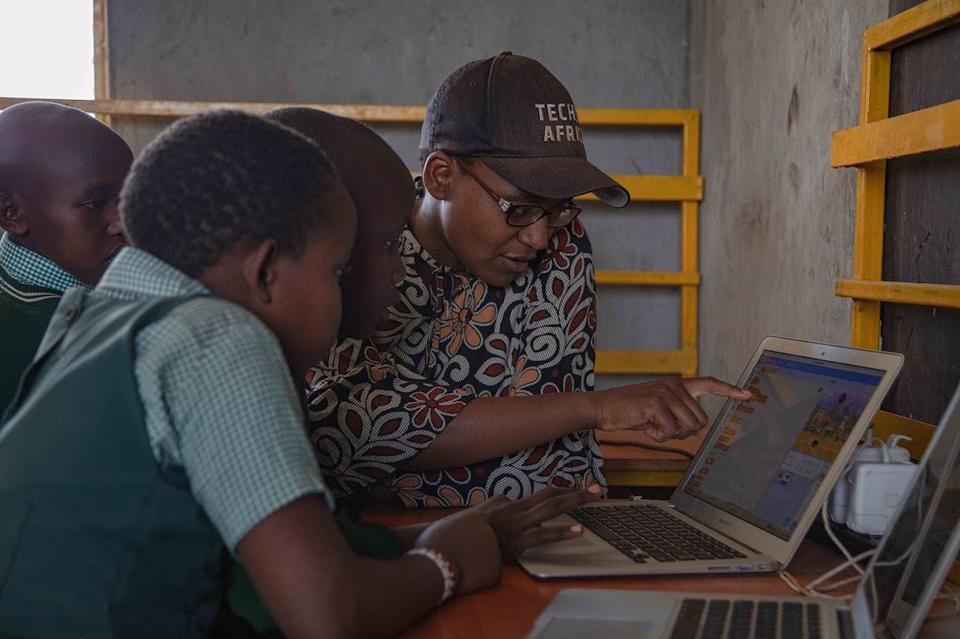I’ll never forget what it was like growing up poor. I’ll never forget it was like my stomach churning because of hunger at night. I would have to go and scavenge for food at trash bins. We grew up in a tin-roof house. It was full of potholes. I used to look at the different light bouncing from the holes on the roof and then just imagine what it would look like to sustainably fix poverty. – Nelly Cheboi
When Nelly Kosi Cheboi was named the CNN Hero of the year 2022, the whole world stood in awe at how a poor Mogotio Kenyan girl would emerge victorious at such a highly competitive global recognition. But just as they always say, there is no glory without a story.
Nelly Kosi Cheboi, just like many other African heroes, grew up in poverty in the rural village of Mogotio in Kenya. Born on November 26, 1992, she received a full scholarship to study computer science at Augustana College in Illinois, USA, in 2012 after completing her basic education in Kenya.
Working and studying is often common among international students in developed countries. Nelly Cheboi stands tall among some African students who have great plans to better their home countries after their studies. With her pathetic childhood experiences in her Mongotio village in mind, Nelly immediately sought to be employed as a Janitor, cleaning bathrooms, at the commencement of her Maths Major study at Augustana College.
Nelly Cheboi who would later become a genius in computer science came across computers by accident in her junior year of college when the need arose for her to take an introduction to Java for her Maths major course. Instead of being overwhelmed by the complexity of the strange gadgets, Nelly fell in love with the computers and that for her was the beginning of her journey to the heroic Nelly we celebrate today.
Her connection with the computers was immediate and fulfilling. “I just fell in love with it. I just knew that that was what I wanted to do and also bring to my community”.
A Profile of Nelly Cheboi’s Philanthropic works:
Acknowledging the fact that she and all her other schoolmates had not come across the computer prior to her journey to the US, Nelly saw the need to get the computers down to her people at all costs. This and the quest to ‘sustainably fix poverty’ birthed Zawadi Yetu; a school built by Nelly in Kenya prior to her graduation from the American Augustana College in 2016.
As of 2018, Nelly had met and married Tyler Cinnamon, an American Software Engineer with whom she began to transport used and donated computers from the United States to Kenya.
“Every three years, companies upgrade their IT. Most of these computers are ending up in landfills. Well, we have kids in Kenya, myself included back in the days, who didn’t even know what a computer was.”
So, partnering with institutions, colleges, companies and individuals, Nelly got these computers down to Zawadi Yetu in Kenya, refurbish them, and install a new Custom Operating System geared towards teaching the Kenyan kids self-efficacy, troubleshooting, the internet and other relevant skills to equip them for the emerging computer world.
Having successfully transported hundreds of computers to Kenya, Nelly founded her nonprofit organisation; TechLit Africa (short for Technologically Literate Africa), with support from her software engineer husband, Tyler Cinnamon, after the duo quit their jobs in America. TechLit Africa, presently headquartered in Kenya at Zawadi Yetu, with over 4000 students aged 4–12 being taught basic computer skills.
“They can go from doing a remote class with NASA to music production, video production, coding, personal branding and so on,” Nelly explained during an interview with CNN.
“I hope that when the first TechLit kids graduate high school, their families and themselves will not need aid because they can now make money online. That money will support their families and themselves. I can’t even describe just how dehumanising poverty is. You’re just getting crushed over and over again,” she added.
One of the core focuses of Techlit Africa is the redistribution of recycled technology from several companies and institutions in America to enable the creation of computer labs in African schools. As of 2022, Cheboi and her team have built 10 computer labs in rural Kenya and have plans for 100 more to continue to teach more African children in rural primary schools digital skills.
Rewards for Good Works
“The reward for work well done is the opportunity to do more.” Jonas Salk
Just as good works attract good rewards, Nelly Cheboi’s good works have attracted awards and recognition from Africa and beyond. From being named one of Forbes Africa’s 30 under 30 on social impact, Nelly became a recipient of one of her greatest awards, the CNN Hero of the Year award for 2022.
For the Forbes award, the process which began in October 2021, saw over a thousand applications and nominations from across the business, technology, sports, health and creative sectors. After some stringent screenings to gather evidence of their endeavours and ventures, Nelly Cheboi meritoriously made it to the list.
Nelly won the CNN Hero of the year award thanks to her philanthropic work through her company TechLit Africa where she secured computers for children in her rural Mongotio village in Kenya.

Cheboi, in her acceptance speech, said she was now targeting more children she intends to equip with computer knowledge from a young age, something she did not have the privilege to have. : “I want to get to 100 schools which translates to 40,000 school-going children. We need to rewrite what it means to grow up in rural Africa because people can work glamorous jobs and still work in your community,” Nelly assured.
As we celebrate Nelly Cheboi, we hope to have more Africans with like minds to make the continent more prominent on the global map.
Long Live Nelly Cheboi!
Long Live Kenya!!
Long Live Africa!!!


